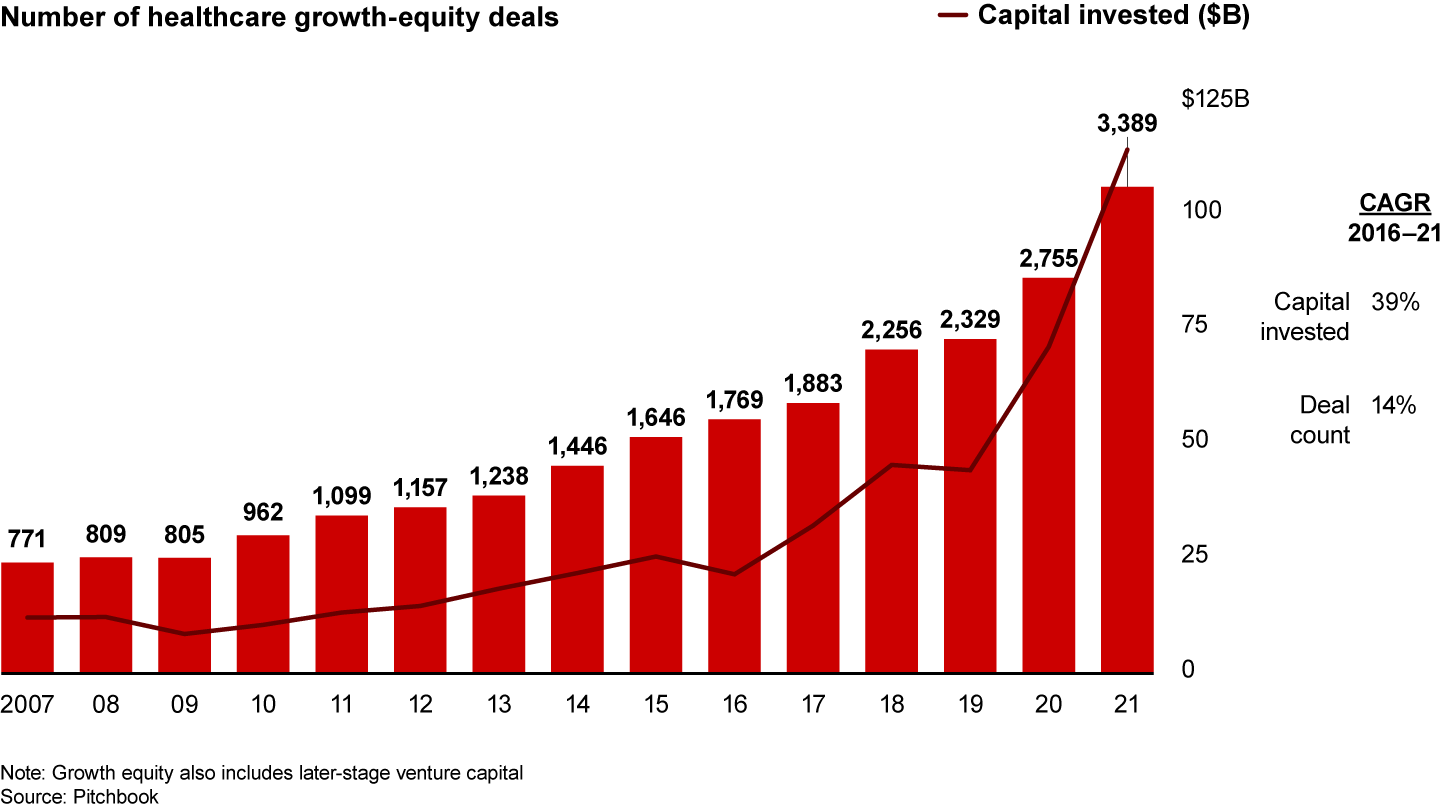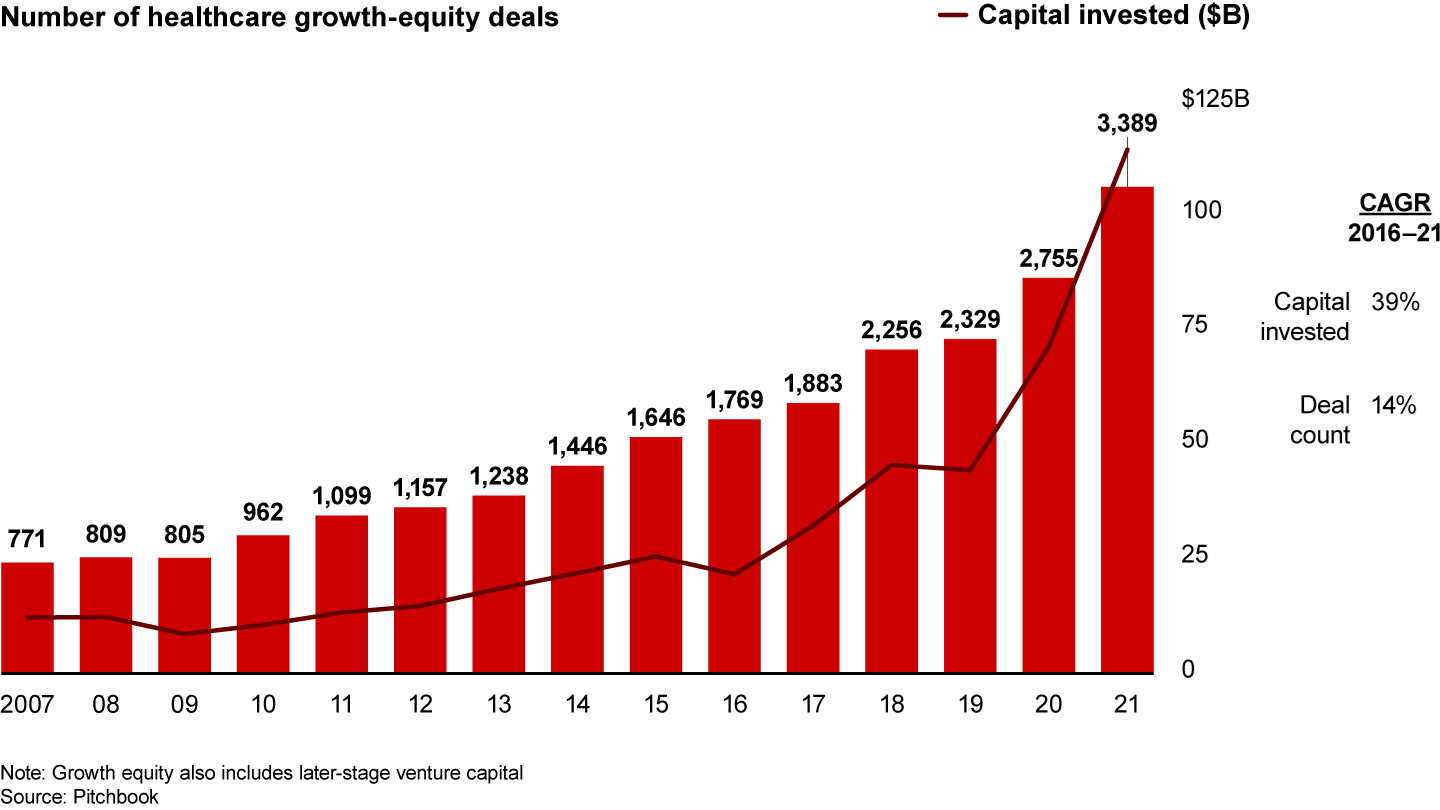Report

At a Glance
- Growth-equity deals and capital invested both set records in 2021, with the largest share going to North America.
- Investors span buyout funds, crossover funds, and growth specialists, each with a unique subsector focus and value creation playbook.
- Funding tended to cluster in employer-sponsored digital health tools, tools that improve provider operations, and technologies that make drug development more efficient.
This article is part of Bain's 2022 Global Healthcare Private Equity and M&A Report
Growth-equity investments in healthcare set records again in 2021. Transactions reached 3,389, compared with 2,755 in 2020. Disclosed capital invested rose to $114 billion from $71.1 billion, with a 5-year compound annual growth rate of 39% (see Figure 1). North American assets continue to be the major beneficiaries, accounting for 50% of global growth-equity deals and 60% of global disclosed capital invested.
Capital deployed through healthcare growth-equity investments has grown quickly in the past five years


More funds have flocked to this space, which consists of investments in relatively mature companies that are seeking capital for expansion or restructuring. The funds range from the growth-equity arms of buyout funds (such as CVC, TPG, and Blackstone) to crossover funds (Tiger Global, Coatue Management, and ICONIQ), to traditional growth specialists (TA Associates, General Atlantic, and Summit Partners).
Among the various investor types, traditional expansionary capital providers have historically been most active, focusing mostly on healthcare services, and that was true in 2021. For example, TPG Growth made a significant investment in IPG, a provider of surgical cost management solutions. But in recent years, the market has also attracted investors focused on high-growth, tech-intensive assets. Notably, Tiger Global has deployed huge amounts of growth capital to fund the expansion of digital health firms such as Dispatch Health, which snared $200 million in a Series D round led by Tiger.
Our analysis found that tech-intensive assets attracted a significant portion of 2021 growth-equity deal activity, particularly in three categories:
- employer-sponsored digital health tools;
- tools that improve provider operations; and
- software focused on biopharma.
Employer-sponsored digital health tools
Digital health tools are redefining how healthcare is delivered and financed. These platforms provide highly scalable services that allow customers to take charge of their health and interact with providers in more convenient formats, such as mobile apps. Unlike traditional providers, these companies sell directly to employers, circumventing payer and provider channels. In addition, digital tools raise patient utilization by making the experience as simple and clear as possible.
Digital health firms that make a compelling case to employers that they lower costs, improve productivity, or reduce absenteeism have grown rapidly and benefited from large growth-equity investments, with some receiving multiple investments in 2021. For example, Hinge Health, a digital musculoskeletal clinic that combines advanced sensors, computer vision, and a full clinical care team, raised growth equity in two rounds, first $300 million and then $600 million, both led by Coatue and Tiger Global. Ginger, an app-based, on-demand mental healthcare company, raised $100 million from Blackstone Growth in March; then in October it merged with Headspace to form Headspace Health, an estimated $3 billion enterprise providing a full spectrum of mental health services. Other such platforms that received significant capital include BetterUp, Lyra, Monogram, and Virta. Growth-equity funds are building forms of tech-enabled, patient-centered, continuous care that aim to improve health outcomes at a lower cost.
Tools that improve provider operations
Growth equity fueled the expansion of software providers that use artificial intelligence (AI) to optimize operations of providers under pressure to raise their productivity. Back-office optimization such as revenue cycle management (RCM) has attracted investors. Olive, a healthcare-focused AI-as-a-service company that automates back-end provider processes, raised $400 million in a round led by Vista Equity Partners and Base10 Partners. Akasa, an AI-driven RCM platform, raised $60 million in a Series B round led by Bond Capital.
Other investments focused on software providers that improve the quality and efficiency of clinical care and patient engagement. For example, PathAI, which applies AI to pathology, raised $165 million in a Series C round led by Tiger Global. Patient engagement also drew investments, including Cedar, a healthcare financial engagement platform that raised $200 million in a Series D round led by Tiger Global.
Software focused on biopharma
Growth-equity investors have demonstrated an appetite for technological tools and data that streamline the course of biopharma development, from drug discovery to clinical trials to product launch. For broader R&D, Benchling, a software-as-a-service (SaaS) company, raised $200 million in a Series E funding round led by Sequoia Capital Global Equities. Related to clinical trials, Warburg Pincus led a $110 million Series C funding round in Aetion, a real-world data platform that helps healthcare stakeholders efficiently assess the safety, effectiveness, and value of medical technologies. Coatue also led a $220 million investment in Reify Health, a technology platform for optimizing patient recruitment. Blackstone Growth and Tiger Global led a $304 million Series D in Medable, a clinical research SaaS company that supports digital and decentralized clinical trials. At the commercialization stage, innovative companies include Komodo, a healthcare and life sciences market intelligence SaaS company, which secured $220 million in a Series E funding round led by Tiger Global.
Growth investors are also funding the use of AI at the preclinical stage of drug development. For example, Insitro, which uses machine learning for drug discovery and development, raised $400 million in a Series C round led by the Canada Pension Plan Investment Board. Exscientia, a clinical-stage pharmatech company that uses proprietary AI to precision engineer its drugs, closed a $225 million Series D round led by SoftBank. Other companies using AI for drug discovery that benefited from growth-equity investment include Insilico Medicine and XtalPi.
Segments promising future growth
Strong returns will no doubt attract more capital to healthcare growth equity, supporting new types of care that empower patients, make processes more efficient, and further digitalization. We expect demand for growth-equity capital to accelerate across traditional healthcare services as well as tech-intensive firms. Digital health tools will remain a target-rich area as the digital management of chronic diseases matures. However, as many subsectors mature with multiple proven providers, private equity funds will need to undertake thorough diligence in order to pick the winners.
Software tools for the biopharma sector will also likely accelerate, presenting new opportunities for value creation by companies that effectively identify and translate drugs into successful therapeutics. Beyond subsectors that thrived in 2021, growth-equity investors will place bets on the broader digital transformation of healthcare.